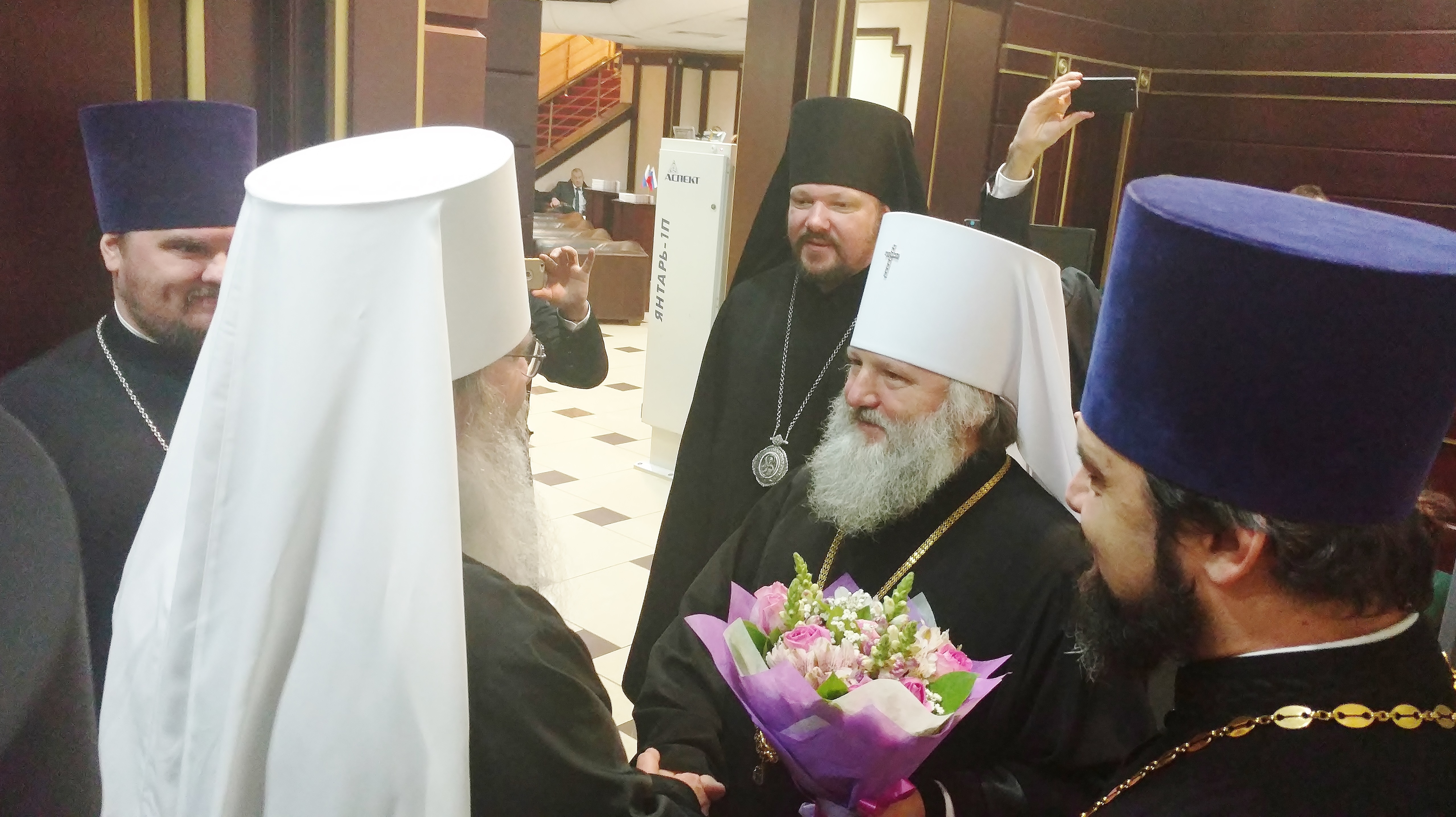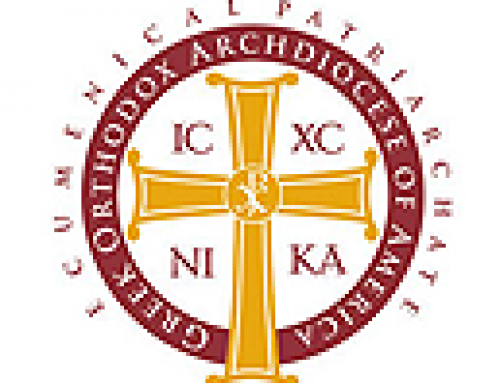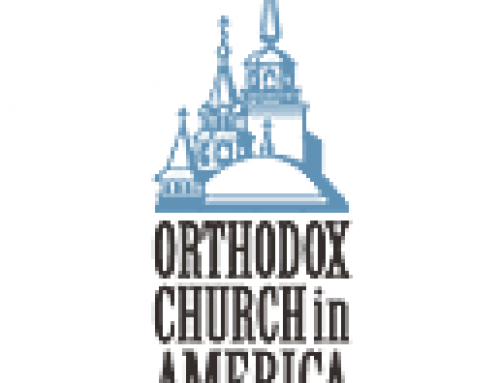This post was originally published on this site

On Saturday, December 2, 2017, His Beatitude, Metropolitan Tikhon was among the Primates of the Local Orthodox Churches who addressed the Bishops Council of the Russian Orthodox Church on the occasion of the 100th Anniversary of the Restoration of the Patriarchate and the Election of Patriarch Tikhon.
As previously announced, Metropolitan Tikhon and a delegation from the Orthodox Church in America, at the invitation of His Holiness, Patriarch Kirill of Moscow, are participating in the special services and events marking these two historic events, the highlight of which was the celebration of the Patriarchal Divine Liturgy in Moscow’s Christ the Saviour Cathedral on Monday, December 4.
It was in 1917—on the eve of the Russian Revolution—that the All-Russian Council, which was meeting in Moscow, elected Saint Tikhon to the Patriarchal Office, thereby reestablishing the Patriarchate which had been abolished in the early 1700s by Emperor Peter the Great. Saint Tikhon had served as Bishop and Archbishop of North America from 1898 until his return to his homeland in 1907.
The complete text of Metropolitan Tikhon’s Address may be found below. A video of his Address may be viewed online. Photos are available on OCA Facebook and Instagram pages. Additional information will be posted as it becomes available.
Address of Metropolitan Tikhon to the Bishops Council of the Russian Orthodox Church
on the Occasion of the Centenary of
the Patriarchate and the Election of Patriarch Tikhon
Saturday, December 2, 2017
Your Holinesses, Your Beatitudes, Your Eminences and Your Graces, Members of the Bishops Council of the Russian Orthodox Church, Honored Guests,
It is a great joy to be here, in the company of my fathers and brothers in Christ, the Primates and leaders of the Orthodox Churches throughout the world, and at the invitation of our brother, His Holiness, Kirill, the 16th Patriarch of Moscow and All Russia, to honor Saint Tikhon, the 11th Patriarch of Moscow and All Russia and first in the line of the restored Patriarchate, the anniversary of which we celebrate this week.
I come to you from the far-away lands of North America, with a small delegation representing the Orthodox Church in America, to offer a few words before this august body concerning the great man of God and confessor whose name I bear and who is also my predecessor in the United States and Canada, where he served as ruling hierarch of the North American diocese from 1898 to 1907.
Bishop Tikhon had a vision for Orthodoxy in America, in which the future united Orthodox Church in the New World would include all the national Orthodox communities, with Arabic, Greek and Serbian bishops leading those communities – all united in one Archdiocese led by a Russian Orthodox Archbishop. There is even a written record showing that Archbishop Tikhon saw a future autocephalous Orthodox Church in the New World. Before leaving America, he succeeded in moving towards realizing his vision, with such actions as the appointment of a Bishop of Brooklyn for the Arab Orthodox and a Bishop of Alaska for the Alaskan native communities.
From the American missionary fields white for harvest, Saint Tikhon returned to Russia to enter a world where dark clouds were gathering and the blood of the Bolshevik revolution would soon begin to spill. The restoration of the Patriarchate in 1917 was not simply an administrative and ecclesiastical decision borne out of historical necessity, but was truly a prophetic event that placed a man of a great integrity and holiness in a position which would become the heaviest of crosses for him, but the source of unity for his flock.
Along with the delegates of the All-Russian Local Council, Patriarch Tikhon was fully aware of the reality of the persecution: bishops monks, and priests rounded up, arrested, humiliated, and shot, simply because of their faith, killed as they carried out their sacred duties; a priest in Stavropol shot in his vestments and carrying a cross; another priest dragged from the altar while serving the liturgy and shot in the church vestibule; a priest murdered while his daughter pleads for his life, his wife begging for his corpse and refused; his three sons later shot that day for protesting their father’s execution. When asked by a reporter what he had heard from around Russia, Patriarch Tikhon replied, “I’ve heard the sound of weeping.”
One hundred years later, we continue to hear the sound of weeping throughout the world, weeping brought on by the increase of human passions, the rise of religious extremism, the division of political polarization and the moral confusion brought about by hearts empty of the love of Christ. All of this has subjected Christians to grave challenges and real persecution. And yet, just as the Local Council did one hundred years ago, so do we today continue to discuss and debate issues such as principles of hierarchy and democracy, primacy and conciliarity, liturgical tradition and renewal, the role of women in the Church, and so forth.
Saint Tikhon was a man deeply rooted in the authentic experience of the Church who was firmly convinced of the ongoing action of the Holy Spirit in the life of the Church and of the responsibility of the shepherds of the Church to find the middle way of the Gospel in all things. He was faced with many agonizing choices and was pressured from many sides. Perhaps he could have echoed the sentiments of the theologian Vladimir Lossky at the outbreak of the Second World War, who said: “Revolutionaries are always in the wrong since, in their juvenile fervor for everything new, in their hopes for a better future and a way of life built on justice, they always base themselves on theories that are abstract, and artificial, making a clean sweep of the living tradition, which is, after all, founded on the experience of centuries. Conservatives are always wrong, too, despite being rich in life experience, despite being shrewd and prudent, intelligent and skeptical. For, in their desire to preserve ancient institutions that have withstood the test of time, they decry the necessity of renewal, and man’s yearning for a better way of life.”
Even in the midst of the fiery trials, Saint Tikhon stood as an image of “meekness in authority” and an icon of the extreme humility and sacrificial love of Jesus Christ. And today, his life and legacy offer all of us hope that our yearning for a better way of life can be found in the Church, even in this post- and anti-Christian world.
As each of us oversees the life and mission of our Churches and dioceses, may we be inspired by the meekness, humility and love of our Father among the saints, Tikhon the Patriarch of Moscow and Enlightener of North America.
Holy Hierarch, Father, and Confessor Tikhon, pray to God for us!



